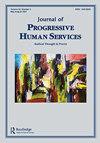Intersectionality and Black Women’s Health: Making Room for Rurality
IF 0.8
Q1 SOCIAL WORK
引用次数: 6
Abstract
ABSTRACT Black women have poorer health compared to their White counterparts in a range of health outcomes, including breast cancer, diabetes, HIV/AIDS, and heart disease. The health disparities literature has largely treated women as a monolithic group, assuming that health practices and treatments are equally applicable and effective for all women. This approach, which places too much emphasis on gender, risks masking the unique experiences of various women based on other social categories. This article argues that in order to advance Black women’s health, an intersectionality approach should be incorporated into health research and practice. This approach, however, should go beyond the usual intersection of race and gender to include rurality. The article builds this argument on the fact that Black women living in rural areas have unique experiences that intersect with their gender, race, and class status. Benefits for embracing the intersectionality approach are discussed.交叉性与黑人女性健康:为道德腾出空间
摘要与白人女性相比,黑人女性的健康状况较差,包括乳腺癌、糖尿病、艾滋病毒/艾滋病和心脏病。健康差距文献在很大程度上将妇女视为一个整体,假设健康实践和治疗对所有妇女都同样适用和有效。这种过于强调性别的方法有可能掩盖基于其他社会类别的各种女性的独特经历。本文认为,为了促进黑人妇女的健康,应将交叉性方法纳入健康研究和实践。然而,这种方法应该超越通常的种族和性别交叉,将农村纳入其中。这篇文章将这一论点建立在这样一个事实之上,即生活在农村地区的黑人女性有着与她们的性别、种族和阶级地位相交叉的独特经历。讨论了采用交叉性方法的好处。
本文章由计算机程序翻译,如有差异,请以英文原文为准。
求助全文
约1分钟内获得全文
求助全文
来源期刊

Journal of Progressive Human Services
SOCIAL WORK-
CiteScore
3.20
自引率
8.30%
发文量
14
期刊介绍:
The only journal of its kind in the United States, the Journal of Progressive Human Services covers political, social, personal, and professional problems in human services from a progressive perspective. The journal stimulates debate about major social issues and contributes to the development of the analytical tools needed for building a caring society based on equality and justice. The journal"s contributors examine oppressed and vulnerable groups, struggles by workers and clients on the job and in the community, dilemmas of practice in conservative contexts, and strategies for ending racism, sexism, ageism, heterosexism, and discrimination of persons who are disabled and psychologically distressed.
 求助内容:
求助内容: 应助结果提醒方式:
应助结果提醒方式:


